Relief as Hezbollah and Israel seem to step back from brink

People at the beach in Tyre noticed that there was smoke coming from the border of Lebanon and Israel while the strikes were happening on Sunday.
For nearly a month, many people in Lebanon have been on edge, anticipating Hezbollah's response to Israel. The entire region was also holding its breath, unsure if this would escalate into a larger conflict.
It was widely believed that the strong Iranian-supported organization would retaliate against Israel for killing one of their top military leaders, Fuad Shukr, on July 30th. The Israelis were able to track him down in the core of Hezbollah's territory in South Beirut. This not only marked a significant loss strategically, but also a public embarrassment.
Only a few hours after that, Hamas leader Ismail Haniyeh was killed in Tehran, in a way that seemed like it was done by Israel. However, Iran is still indicating that they may seek revenge over a prolonged period of time.
On Sunday at 05:15, Hezbollah took action by sending over 300 Katyusha rockets and numerous drones into Israel's borders. This retaliation was planned carefully and was not as intense as some predicted.
Hezbollah claimed they aimed for 11 military bases and barracks, saying their attack was successful. However, the Israel Defense Forces (IDF) stated that the majority of the rockets did not hit their intended targets.
In any case, Hezbollah did not target major cities in Israel or critical infrastructure. They also did not use their most powerful weapons. The organization, labeled as a terrorist group by the UK and the US, is thought to possess a larger arsenal than some countries.
Israel was the first to strike at 04:30, sending a large number of fighter jets into the sky to attack Hezbollah firing positions. The IDF described this attack as a "pre-emptive strike" that successfully destroyed numerous rocket launchers.
Hezbollah rockets caused destruction to many houses in the Israeli town of Acre near the coast.
This recent conflict was the most intense escalation we've seen since the start of the Gaza war last October, following an incident where Hamas claimed the lives of 1,200 individuals in Israel within a 24-hour period.
After that, Hezbollah has been exchanging gunfire with Israel along their common border, demonstrating backing for its associate Hamas, and declaring unity with the residents of Gaza.
Where are we at now, one day later? The Middle East might actually be a bit more secure, believe it or not.
Both parties have communicated their intentions, but have not escalated to a full-on conflict. Hezbollah has indicated that they are willing to put an end to the Fuad Shukr situation - at least for now.
"We may choose to respond later, but for now, people can relax and go about their business," stated Sheikh Hassan Nasrallah, the head of Hezbollah.
After a stressful month, that message was well received by many people.
He was speaking to his followers on television from a secret location - he could be at the top of Israel's list of people to target for assassination.
The Prime Minister of Israel, Benjamin Netanyahu, stated that the recent attacks on Hezbollah on Sunday were just the beginning.
However, diplomats informed Reuters that both parties had communicated their desire to avoid any additional escalation.
A Hamas spokesperson is said to have escaped unharmed from an Israeli drone attack in the southern Lebanese port town of Sidon on Monday.
In the southern part of Lebanon, there has been a resurgence of the typical minor conflicts.
Israel recently made another assassination attempt in Sidon, a port city. They left a car on fire in the streets. According to local reports, the intended target was a Hamas leader who was able to escape in time.
By the shoreline in Tyre, Israeli military planes are flying close to the ground, creating loud booms - yet the beach down below is filled with people.
"Today feels really peaceful," commented a young man in his 20s who preferred to remain anonymous.
Things have gone back to normal. The streets are calm again, but people are out and about. Today, people are able to relax and breathe freely once more.
Hezbollah decided to postpone its response to allow for discussions about stopping the fighting in Gaza. However, the recent negotiations in Egypt have concluded without any clear advancements.
As the conflict in Gaza continues, spreading fear and violence, it is creating unrest in the Middle East.







































